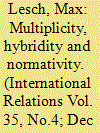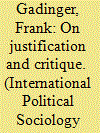| Srl | Item |
| 1 |
ID:
182570


|
|
|
|
|
| Summary/Abstract |
In 2014, Germany became the 173rd state to ratify the UN Convention against Corruption (UNCAC) – after more than ten years of disputes in the German parliament. To make sense of the protracted debates about ratifying UNCAC, the article follows the recent introduction of Luc Boltanski’s pragmatic sociology to International Relations (IR). I argue that this approach opens new avenues for researching normativity in hybrid arrangements of multiple, overlapping orders of worth and through ongoing tests of the right evaluation of a situation. I show that the belayed ratification of UNCAC in Germany was the result of the hybridity inherent to norms against corruption. In the debates, members of the German parliament relied on competing normative inventories to translate the term ‘public official’ to the German context and to settle the meaning of corruption. This article contributes to IR norm research by unpacking normative multiplicity and contradictions that undergird international norms and disputes about them.
|
|
|
|
|
|
|
|
|
|
|
|
|
|
|
|
| 2 |
ID:
147938


|
|
|
|
|
| Summary/Abstract |
Luc Boltanski is one of the most important contemporary social theorists. Whether and how his sociology matters for International Relations (IR) theory has, so far, not been explored. Boltanski’s work, as this article demonstrates, can greatly advance international political sociology by further developing a practice theoretical account which reconciles Bruno Latour’s Actor-Network Theory and Pierre Bourdieu’s praxeology. Boltanski’s pragmatic sociology is mainly inspired by pragmatism and ethnomethodology, but it is still concerned with sociology as a critical project of emancipation. He aims to renew critical sociology by focusing on the ‘critical capacities’ ordinary actors use in disputes and controversies of political life. Practices of justification and critique as triggers of conflicts and sources of agreements are consequently the subjects of analysis. This implies, furthermore, a strong notion of normativity in practice, which reveals a blind spot in current debates in IR. Justification becomes a social practice through which diverging legitimacy claims are tested under conditions of uncertainty. Such a view is conceptually and methodologically relevant for IR scholars interested in contested norms, moral ambiguity, and the fragile character of political reality. Considering Boltanski’s work broadens the empirical scope of practice theory and provides promising new directions for IR theory.
|
|
|
|
|
|
|
|
|
|
|
|
|
|
|
|